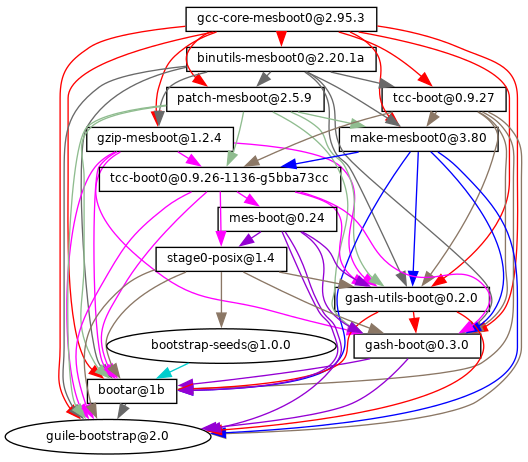Next: Preparing to Use the Bootstrap Binaries, Up: Bootstrapping [Contents][Index]
20.1 The Full-Source Bootstrap
Guix—like other GNU/Linux distributions—is traditionally bootstrapped from a set of bootstrap binaries: Bourne shell, command-line tools provided by GNU Coreutils, Awk, Findutils, ‘sed’, and ‘grep’ and Guile, GCC, Binutils, and the GNU C Library (see Bootstrapping). Usually, these bootstrap binaries are “taken for granted.”
Taking the bootstrap binaries for granted means that we consider them to be a correct and trustworthy “seed” for building the complete system. Therein lies a problem: the combined size of these bootstrap binaries is about 250MB (see Bootstrappable Builds in GNU Mes). Auditing or even inspecting these is next to impossible.
For i686-linux and x86_64-linux, Guix now features a
full-source bootstrap. This bootstrap is rooted in
hex0-seed from the Stage0 package. The hex0 program is minimalist assembler: it reads
space-separated hexadecimal digits (nibbles) from a file, possibly
including comments, and emits on standard output the bytes corresponding
to those hexadecimal numbers. The source code of this initial hex0
program is a file called
hex0_x86.hex0
and is written in the hex0 language.
Hex0 is self-hosting, which means that it can build itself:
./hex0-seed hex0_x86.hex0 hex0
Hex0 it is the ASCII-equivalent of the binary program and can be produced by doing something much like:
sed 's/[;#].*$//g' hex0_x86.hex0 | xxd -r -p > hex0 chmod +x hex0
It is because of this ASCII-binary equivalence that we can bless this initial 357-byte binary as source, and hence ‘full-source bootstrap”.
The bootstrap then continues: hex0 builds hex1 and then on
to M0, hex2, M1, mescc-tools and finally
M2-Planet. Then, using mescc-tools, M2-Planet we
build Mes (see GNU Mes Reference Manual in GNU Mes, a
Scheme interpreter and C compiler in Scheme). From here on starts
the more traditional C-based bootstrap of the GNU System.
Another step that Guix has taken is to replace the shell and all its utilities with implementations in Guile Scheme, the Scheme-only bootstrap. Gash (see Gash in The Gash manual) is a POSIX-compatible shell that replaces Bash, and it comes with Gash Utils which has minimalist replacements for Awk, the GNU Core Utilities, Grep, Gzip, Sed, and Tar.
Building the GNU System from source is currently only possible by adding
some historical GNU packages as intermediate steps41. As Gash and Gash Utils mature,
and GNU packages become more bootstrappable again (e.g., new releases of
GNU Sed will also ship as gzipped tarballs again, as alternative to the
hard to bootstrap xz-compression), this set of added packages can
hopefully be reduced again.
The graph below shows the resulting dependency graph for
gcc-core-mesboot0, the bootstrap compiler used for the
traditional bootstrap of the rest of the Guix System.

Work is ongoing to bring these bootstraps to the arm-linux and
aarch64-linux architectures and to the Hurd.
If you are interested, join us on ‘#bootstrappable’ on the Libera.Chat IRC network or discuss on bug-mes@gnu.org or gash-devel@nongnu.org.